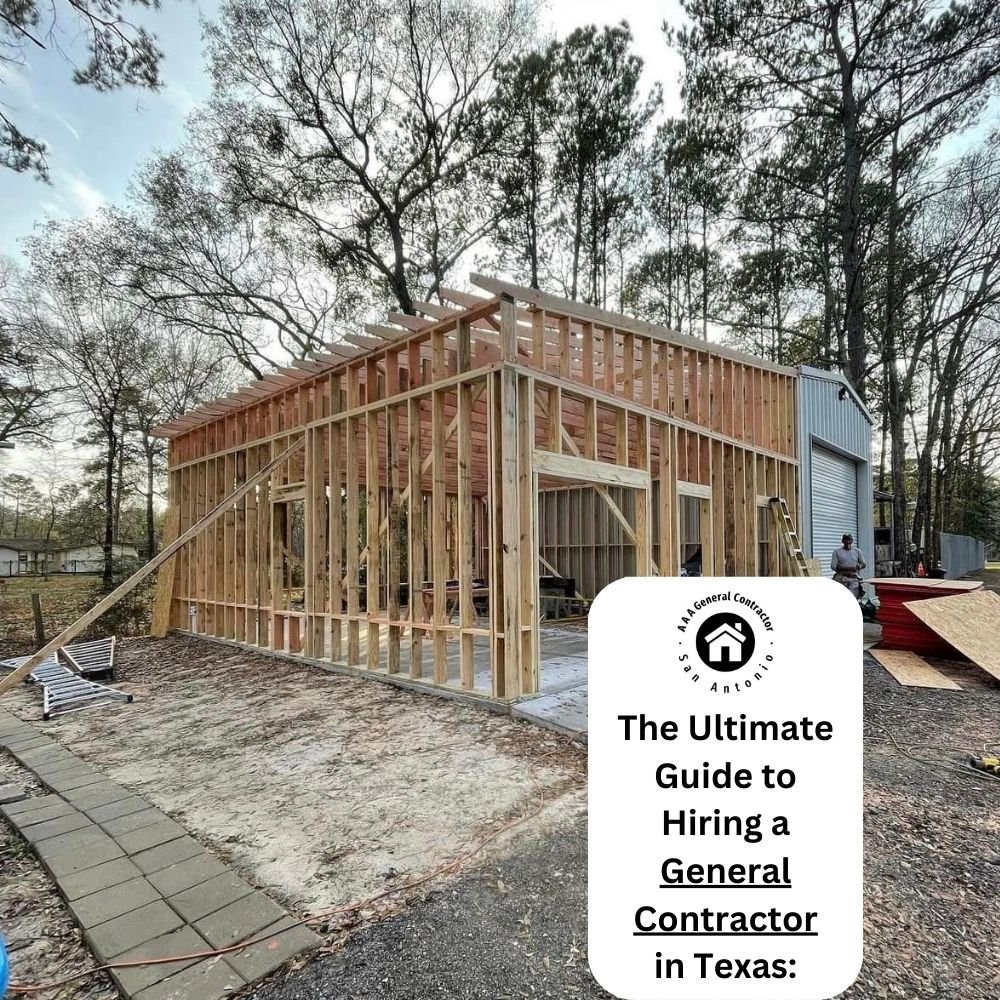The Ultimate Guide to Hiring a General Contractor in Texas:
Undertaking a construction project in Texas, whether it’s a home renovation, commercial build-out, or new construction, requires careful planning and the right team to bring your vision to life. At the heart of this team is the general contractor – the orchestrator of the entire project. Hiring the right general contractor is crucial for the success of your venture. In this comprehensive guide, we’ll explore the key factors to consider when hiring a general contractor in Texas, ensuring a smooth and successful construction experience.

1. Define Your Project Scope and Goals
Before you start searching for a general contractor, it’s essential to have a clear understanding of your project scope and goals. Outline your project’s specifics, including the type of construction, desired timeline, and budget constraints. Knowing your objectives will help you communicate effectively with potential general contractors and ensure they understand your vision.
2. Check for Licensing and Insurance
In Texas, a general contractor must be licensed to operate legally. Verify that any contractor you consider is licensed and in good standing with the Texas Department of Licensing and Regulation (TDLR). A valid license ensures that the contractor has met the state’s requirements for education, experience, and financial responsibility.
Additionally, confirm that the general contractor carries adequate insurance coverage. This includes both general liability insurance and workers’ compensation insurance. Insurance protects you, the property owner, from liability in case of accidents or property damage during the construction process.
3. Evaluate Experience and Track Record
Experience is a key factor when selecting a general contractor. Assess the contractor’s track record by reviewing their portfolio of completed projects. Look for projects similar in scope and complexity to yours. A seasoned contractor is better equipped to handle unexpected challenges, coordinate subcontractors, and deliver a successful outcome.
Ask for references from past clients and contact them to inquire about their experiences. This firsthand feedback provides valuable insights into the contractor’s communication skills, reliability, and the overall quality of their work.
4. Verify Financial Stability
Construction projects involve significant financial commitments, and you want a general contractor with financial stability. Request financial references and check the contractor’s credit history. A financially stable contractor is more likely to manage the project budget effectively, pay subcontractors promptly, and navigate any financial challenges that may arise during construction.
5. Understand the Bidding Process
General contractors typically provide estimates through a bidding process. Be wary of contractors who provide unusually low bids, as they may cut corners or use subpar materials to meet the budget. On the other hand, excessively high bids may indicate inflated prices.
Ask potential contractors for a detailed breakdown of their bid, including material costs, labor costs, and any additional charges. This transparency allows you to make informed decisions and compare bids accurately.
6. Communication and Project Management Skills
Effective communication and project management are crucial for the success of any construction project. During your initial interactions with a general contractor, assess their communication style. A reliable contractor should be responsive, attentive to your concerns, and capable of explaining complex construction concepts in a way that you can understand.
Inquire about the contractor’s project management approach. How do they handle scheduling, coordinate subcontractors, and address unexpected issues? A well-organized and communicative general contractor is more likely to keep your project on track.
7. Subcontractor Relationships
General contractors often work with subcontractors for specialized tasks such as plumbing, electrical work, or roofing. Inquire about the general contractor’s relationships with subcontractors. A contractor with a reliable network of skilled and trusted subcontractors is better equipped to ensure the quality and efficiency of your project.
Ask about the subcontractors’ qualifications, licensing, and insurance to ensure they meet the same standards as the general contractor. Clear communication between the general contractor and subcontractors is crucial for a seamless construction process.
8. Understanding of Local Building Codes and Permits
Texas has specific building codes and regulations that vary by city and county. A knowledgeable general contractor should be well-versed in these codes and ensure that your project complies with all necessary permits and regulations. Failure to adhere to local building codes can result in costly delays and legal issues.
Ask the general contractor about their experience working in your specific location and how they plan to navigate the permitting process. A competent contractor will have a thorough understanding of the local regulatory landscape.
9. Payment Schedule and Contract Terms
Review the proposed payment schedule and contract terms before signing any agreement. A reputable general contractor will provide a detailed contract outlining the scope of work, project timeline, payment schedule, and any warranties or guarantees.
Beware of contractors who request a large upfront payment before starting work. A standard payment schedule involves an initial deposit, followed by scheduled payments at project milestones. Ensure that the contract includes provisions for handling unforeseen issues, change orders, and project delays.
10. Trust Your Instincts and Gut Feeling
Ultimately, trust your instincts when selecting a general contractor. If a contractor exhibits professionalism, transparency, and a genuine interest in your project, it’s a positive sign. Pay attention to how well you communicate with the contractor and whether they actively listen to your concerns.
If something feels off or you encounter red flags during the hiring process, it’s okay to explore other options. Your comfort and confidence in your chosen general contractor are essential for a successful construction journey.
Conclusion
Hiring a general contractor in Texas is a significant decision that can greatly impact the outcome of
your construction project. By following this ultimate guide and carefully evaluating each potential contractor, you’ll be well-equipped to make an informed decision. Remember that effective communication, experience, and a commitment to quality are key qualities to seek in a general contractor. With the right team in place, your construction project in Texas can become a seamless and successful reality.
